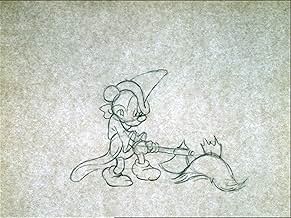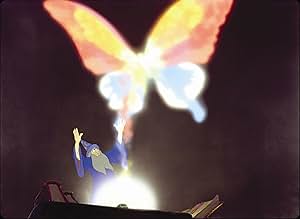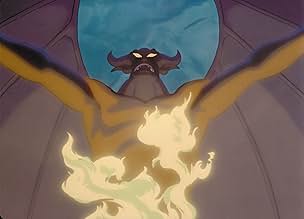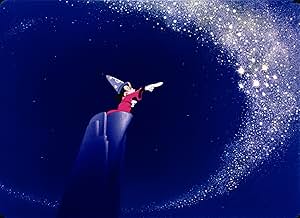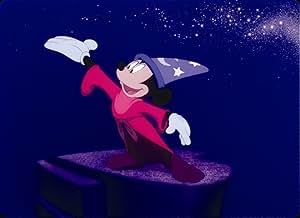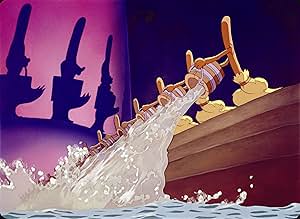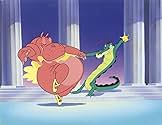Fantasia
- 1940
- Tous publics
- 2h 4min
Une suite de huit dessins animés illustrant de grands morceaux de musique classique.Une suite de huit dessins animés illustrant de grands morceaux de musique classique.Une suite de huit dessins animés illustrant de grands morceaux de musique classique.
- Récompenses
- 9 victoires et 1 nomination au total
Corey Burton
- Narrator: Deems Taylor overdubs (2000 restoration)
- (voix)
- (non crédité)
Walt Disney
- Mickey Mouse (segment 'The Sorcerer's Apprentice')
- (voix)
- (non crédité)
Hugh Douglas
- Narrator (1982 version)
- (voix)
- (non crédité)
James MacDonald
- Percussionist
- (non crédité)
Tim Matheson
- Narrator (1985 version)
- (voix)
- (non crédité)
Julietta Novis
- Soloist (segment 'Ave Maria')
- (voix (chant))
- (non crédité)
Paul J. Smith
- Violinist
- (non crédité)
Avis à la une
2017 is a year of technical marvel. Looking at movies of today, we see massive, stunning works of animation. We can now achieve computer generated images that look nearly indistinguishable from reality, and at the forefront of movie making today is Disney. Through Marvel, Disney creates multiple action packed superhero blockbusters a year. Star Wars, after it's 2015 revival, has new movies being released annually. Pixar, after creating several successful franchises, is now resting on its laurels, creating sequels like Finding Dory, Toy Story 4, Cars 3 and Incredibles 2. Even Disney's in house animation team is finding success, bringing back the Disney princess formula with movies like Frozen and Moana. However, amidst all this success, we have lost the truly human touch. Fantasia perfectly captures all that was lost in today's Disney movies. The movie has a very personal and human feel to every aspect of it. The orchestra, a very tangible presence in the movie, feels alive. They laugh, play their own little tunes during the intermission, but most importantly, they make mistakes. The animation is the same way, It's very rough at times and sometimes lacking, with some animations being reused, however every shot is filled with passion. You can tell that people worked on this, people with ambition, though they were not perfect. In modern movies, this beautiful animation that looks so real lacks the touch of individualism that Fantasia has in spades. The scene of the Sorcerer's apprentice dancing around the broom is burned into our collective memory for a reason. In all its flaws, its rough edges, it feels real to us. We can see all the raw effort and energy that the animator's put into each of Mickey's footsteps and that resonates with us. Fantasia speaks to the viewer not because it's perfect, but because it's flawed.
Disney's "Fantasia" is a pure classic.
What we are shown are a few animated musicals, filled with grand splendor and vivid colors.
"Fantasia" is one of those films that everyone knows by heart, and has watched since being a child.
My personal favorite was always the Mickey Mouse short - one of the darkest Mickey cartoons I've ever seen.
If you haven't seen "Fantasia" yet, then you must be from another planet. It is one of the best Disney musicals ever, which some push aside and forget too easily.
5/5 stars-
John Ulmer
What we are shown are a few animated musicals, filled with grand splendor and vivid colors.
"Fantasia" is one of those films that everyone knows by heart, and has watched since being a child.
My personal favorite was always the Mickey Mouse short - one of the darkest Mickey cartoons I've ever seen.
If you haven't seen "Fantasia" yet, then you must be from another planet. It is one of the best Disney musicals ever, which some push aside and forget too easily.
5/5 stars-
John Ulmer
This is one of the truly rare, one of a kind movie going experiences, kind of in the same league as watching 2001: A Space Odyssey. I like to watch this film repeatedly; often times I'll just close my eyes and daydream, letting my own imagination go in place of whats on the screen. My favorite part is the opening sequence, with its dramatic music and free flowing imagery foreshadowing the state of the world in 1940. The end of Ave Maria is the perfect bookend to this masterpiece; death has withdrawn and peace has finally arrived. It would, but not for another five years and millions of lives. I can never watch this movie without seeing it in this context; for me its a work of art, both a part and ahead of its time.
This without a doubt the greatest animated film in history. While highly acclaimed and well-known today, it was not terribly popular when it was first released. The idea of "Fantasia" is to take great pieces of music and draw animated sequences that match them. In doing so, it reverses the purpose of a movie's score; the movie serves and matches the music, not the other way around. This set up also means that there is no typical formula plot that is present in the vast majority of movies. In the first piece, the animation is vague and abstract, but in later ones it is of definite actions, objects, and stories. The two most famous(and my favorite) parts are probably "The Sorcerer's Apprentice" and "Rite of Spring". "Fantasia" is not only the best animated film ever made, but one of the greatest films period.
This unusual and very creative classic of animation combines a very interesting idea with quite a bit of imagination, plus visual effects that still hold up quite well. All but a couple of the sequences are quite enjoyable, and some especially so. Even the segments that don't work as well are usually at least interesting, since you can at least appreciate what they were trying to accomplish.
You don't really have to be all that familiar with the specific pieces of music for it to be worthwhile, since in several cases they chose to match the music with material that is rather different in nature from any original context that it may have had. And in any case, the animated sequences are intended to provide the context, in terms of the movie.
No doubt, everyone will have his or her own favorite segments, based on the music itself and on the choice of accompanying visual material. The "Sorcerer's Apprentice" sequence, with Mickey Mouse, is certainly one of the most memorable. The adaptation of "The Rite of Spring" is quite imaginative in using an entirely different setting for the music. "Night on Bald Mountain" has striking and sometimes bizarre visuals.
Many of the classic Disney features still hold up well as family entertainment, but "Fantasia" is unique for its combination of imaginative concept and visual creativity. Not every minute of it works, but that's the price of being willing to experiment. It's an enjoyable and satisfying feature that well deserves to be remembered.
You don't really have to be all that familiar with the specific pieces of music for it to be worthwhile, since in several cases they chose to match the music with material that is rather different in nature from any original context that it may have had. And in any case, the animated sequences are intended to provide the context, in terms of the movie.
No doubt, everyone will have his or her own favorite segments, based on the music itself and on the choice of accompanying visual material. The "Sorcerer's Apprentice" sequence, with Mickey Mouse, is certainly one of the most memorable. The adaptation of "The Rite of Spring" is quite imaginative in using an entirely different setting for the music. "Night on Bald Mountain" has striking and sometimes bizarre visuals.
Many of the classic Disney features still hold up well as family entertainment, but "Fantasia" is unique for its combination of imaginative concept and visual creativity. Not every minute of it works, but that's the price of being willing to experiment. It's an enjoyable and satisfying feature that well deserves to be remembered.
Le saviez-vous
- AnecdotesThe animators secretly modeled elements of the Sorcerer in "The Sorcerer's Apprentice" on their boss, Walt Disney. The raised eyebrow was regarded as a dead giveaway. They call the character Yen Sid, which is "Disney" spelled backwards.
- GaffesWhen introducing the "Pastoral" sequence, Deems Taylor mixes Greek and Roman names of deities: Bacchus, Vulcan and Diana are Roman; Zeus, Iris and Morpheus are Greek. Apollo is the only one whose Greek and Roman equivalents have the same name.
- Citations
Mickey Mouse: [Pulling on Stokowski's coat] Mr. Stokowski! Mr. Stokowski!
[Mickey whistles to get Stokowski's attention]
Mickey Mouse: My congratulations, sir!
Leopold Stokowski: [shaking hands with Mickey] Congratulations to you, Mickey!
Mickey Mouse: Gee, thanks! Hehe! Well, so long! I'll be seeing ya!
Leopold Stokowski: Goodbye!
- Crédits fousThere are no closing credits of any kind. Not even the words "THE END" appear on the screen.
- Versions alternativesBefore the 1990 re-release, the film was shown with no credits other than the title and the RKO logo. Leopold Stokowski received a written credit only on the posters advertising the film. In the film's original roadshow release, not even the title was shown at the beginning of the film - that was saved for the intermission break.
- ConnexionsEdited into Un monde est né (1955)
- Bandes originalesToccata and Fugue in D Minor, BWV 565
Composed by Johann Sebastian Bach
Orchestrated by Leopold Stokowski (uncredited)
Played by The Philadelphia Orchestra
Conducted by Leopold Stokowski
Meilleurs choix
Connectez-vous pour évaluer et suivre la liste de favoris afin de recevoir des recommandations personnalisées
Détails
Box-office
- Budget
- 2 280 000 $US (estimé)
- Montant brut aux États-Unis et au Canada
- 76 408 097 $US
- Week-end de sortie aux États-Unis et au Canada
- 980 798 $US
- 10 févr. 1985
- Montant brut mondial
- 76 414 517 $US
- Durée
- 2h 4min(124 min)
- Couleur
- Mixage
- Rapport de forme
- 1.37 : 1
Contribuer à cette page
Suggérer une modification ou ajouter du contenu manquant





